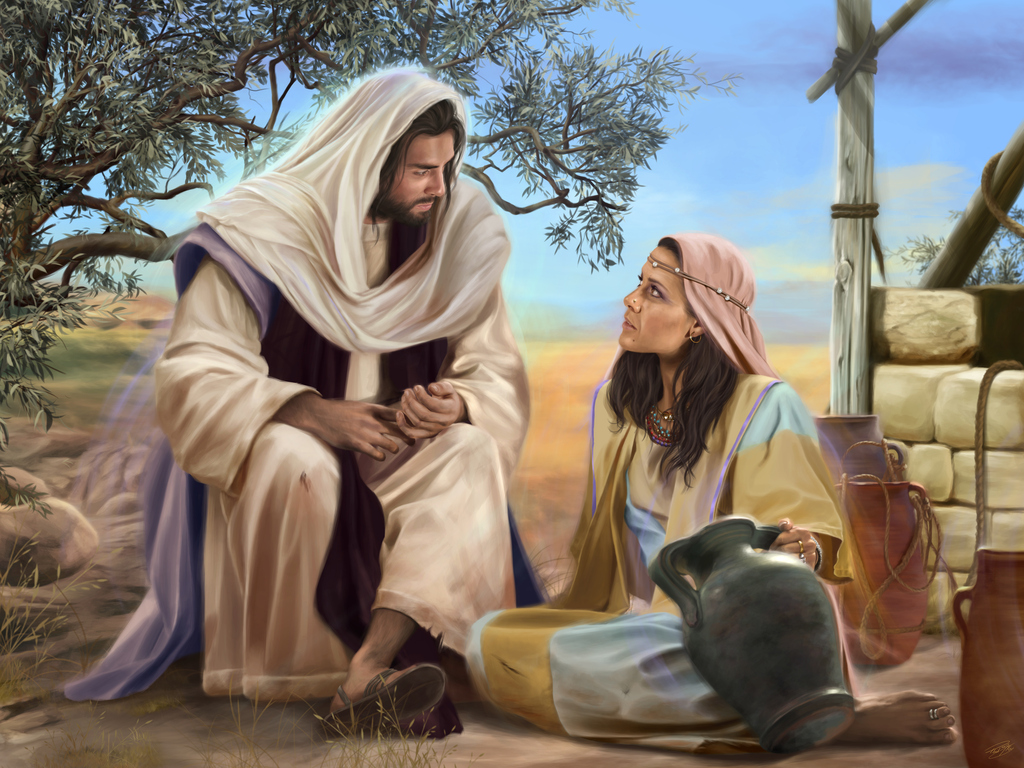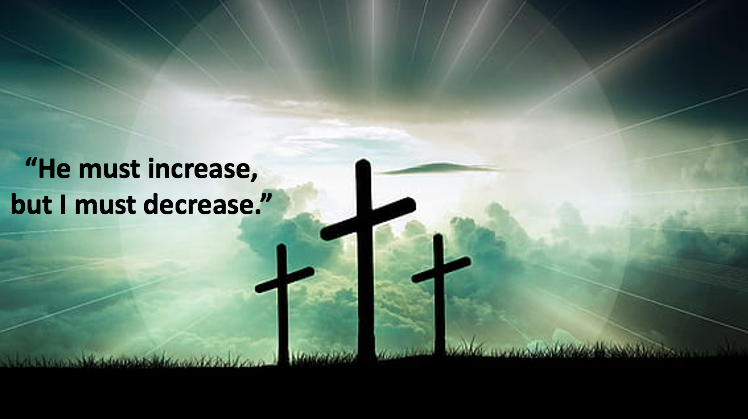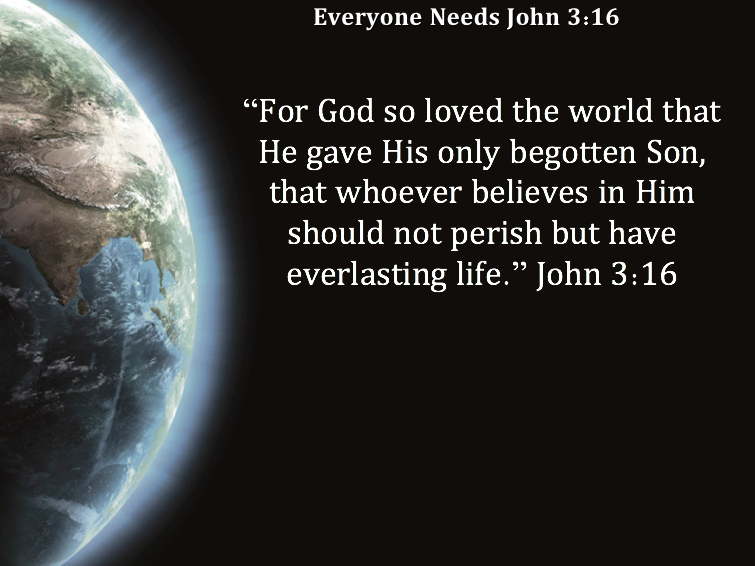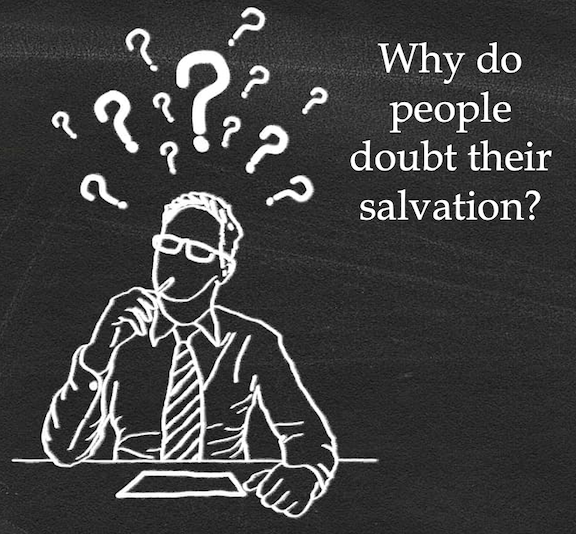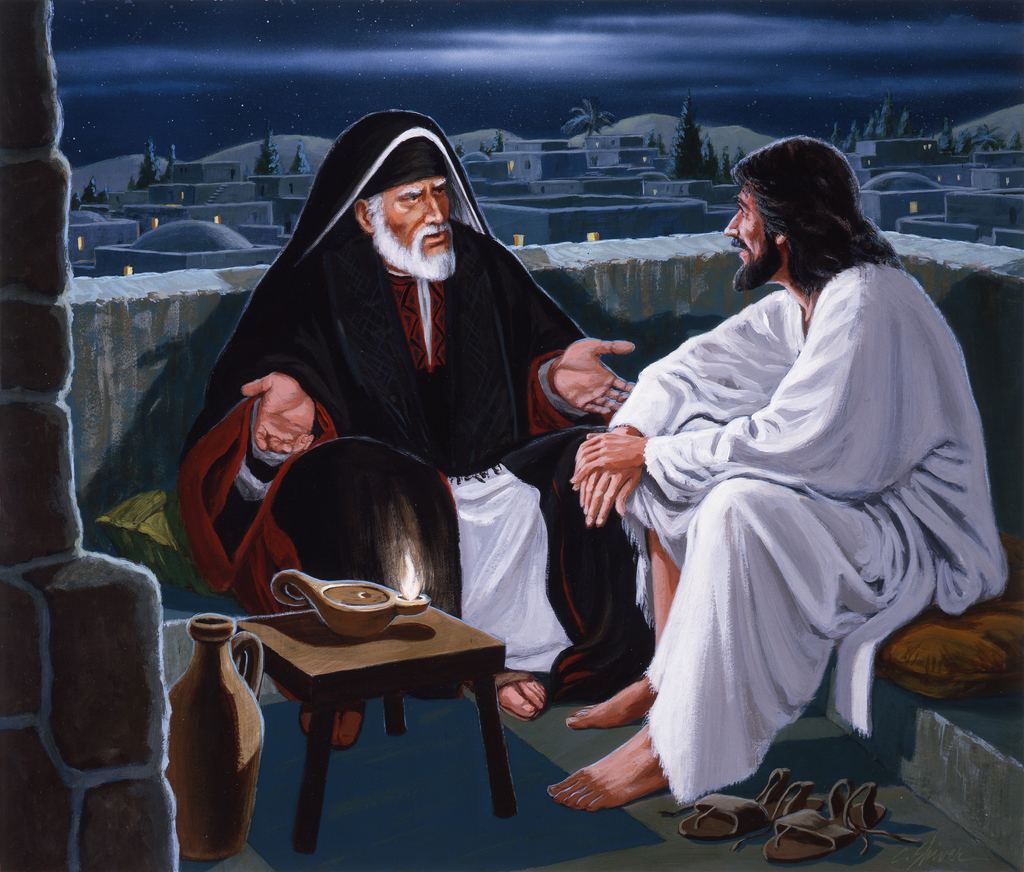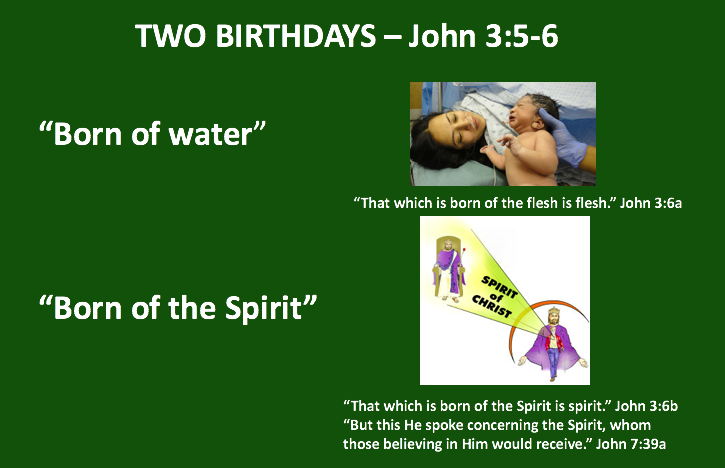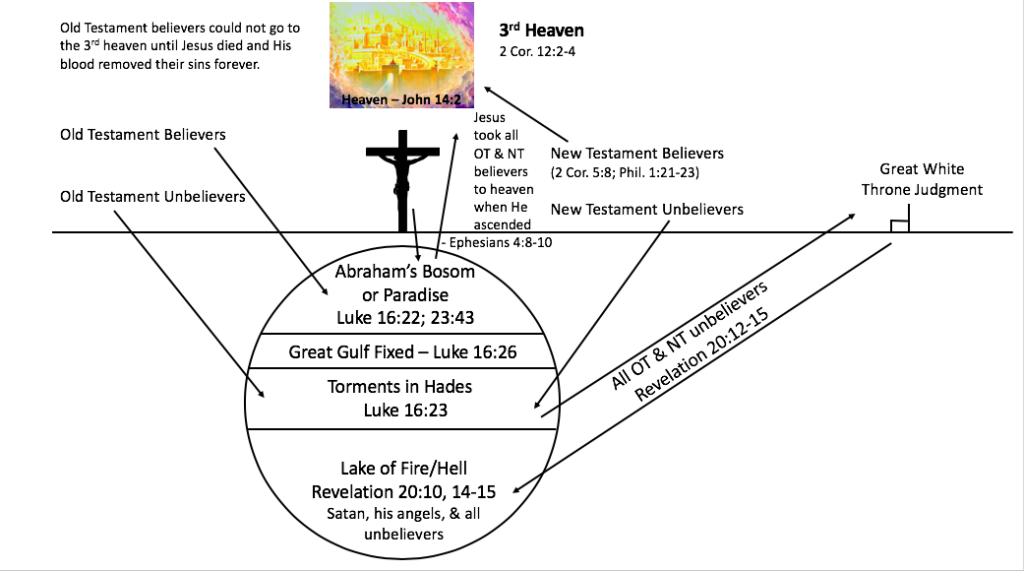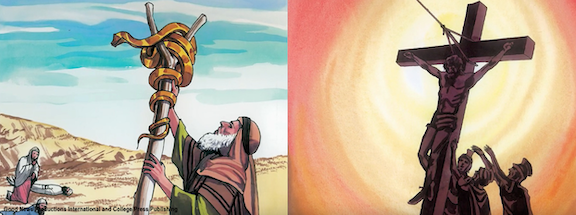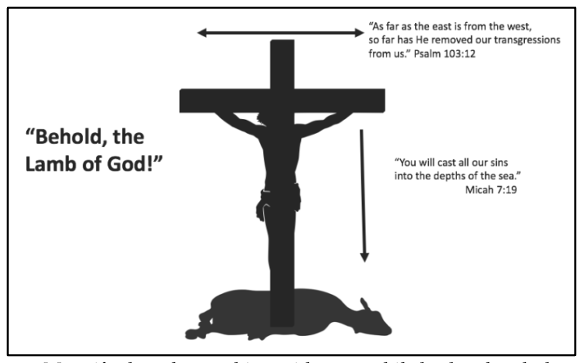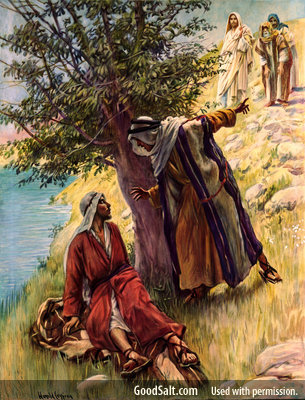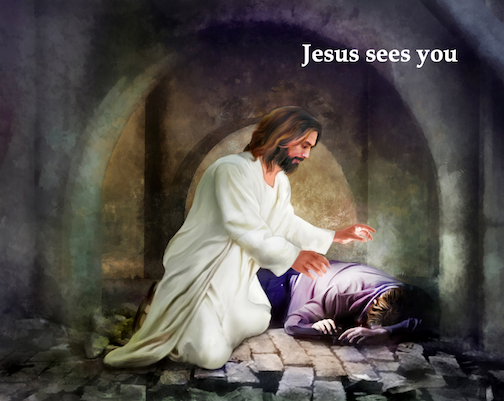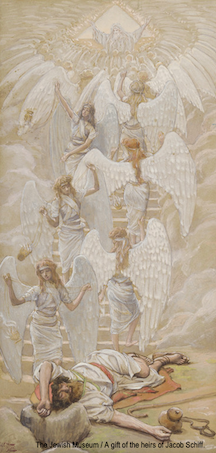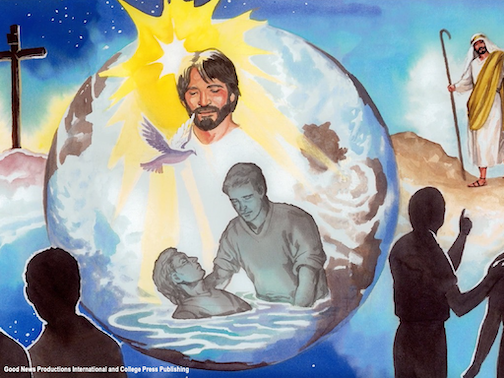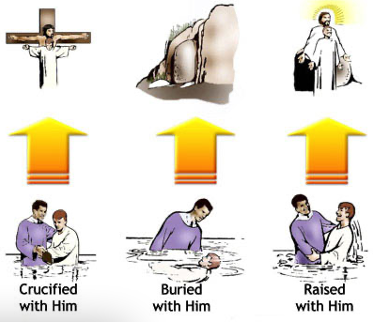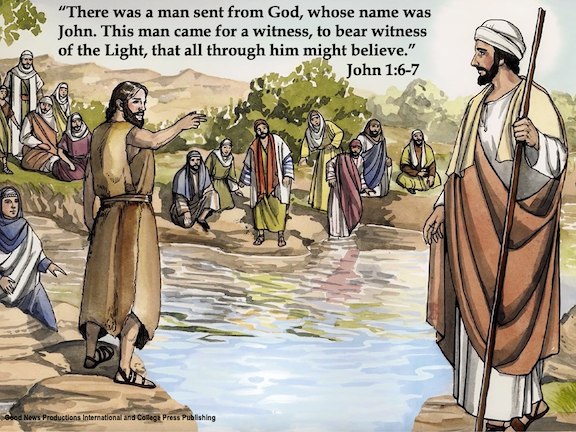“Jesus answered and said to her, ‘If you knew the gift of God, and who it is who says to you, ‘Give Me a drink,’ you would have asked Him, and He would have given you living water.’” John 4:10
In the fall of 2019, I began to realize that I had some life-controlling problems that I could not overcome on my own. So, I began a process of recovery to overcome trauma-based addictions that were destroying my life and my relationships with those closest to me.
Much of my battle with these addictions involves shame. Many people confuse shame with guilt. Guilt is the conviction we experience when we have violated God’s standard of holiness. In short, guilt says, “I have done wrong.” For example, when a person covets, hates, lies, lusts, murders, steals, or commits adultery, he or she has a sense of guilt for having done wrong (cf. Ps. 32:1-5; Rom. 3:1-20; James 2:10). The Bible teaches us that sin and its subsequent guilt can lead an unsaved person to believe or trust in Christ alone as his or her Savior, resulting in cleansing and forgiveness (cf. John 16:8-11; Acts 10:43; Rom. 3:20; Gal. 3:22-24). God uses our guilt to convict us of our need for Him.
The Hebrew word for “ashamed” (cf. Gen. 2:25) is bosh, which means to fall into disgrace, to be embarrassed or humiliated. [1] The Greek word for “shame” (Heb. 12:2) is aischynēs which also refers to disgrace. [2] According to some theologians and psychologists, shame is a feeling (or belief) that we are bad, defective, flawed, and worthless.
Guilt says, “I have done wrong,” but shame says, “I am wrong.” [3] Instead of focusing on what a person has done (guilt), shame focuses on who the person is. It says that at the core of our being we are bad, flawed, inferior, unacceptable, and unworthy. One author says, “Shame is a strong sense of being uniquely and hopelessly different and less than other human beings.” [4] Satan uses shame to condemn us and isolate us from God and one another.
Let me illustrate the difference between guilt and shame. When I say, “I feel bad about yelling at my children when they misbehave,” that is guilt. But when I say, “I am a bad father,” that is shame.
We can feel guilt and shame at the same time. But shame is more relational. We can feel shame because of our own actions and the actions of others. There are two types of shame: true shame and false shame.
True shame is that feeling of disgrace or embarrassment when we have sinned. This is what Adam and Eve experienced when they disobeyed God in the garden of Eden (Gen. 3:7-8, 10).
False shame is that same feeling of disgrace or embarrassment about our personhood, not our actions. We can experience shame when we have done nothing wrong, but because of the actions of others we are ashamed. False shame says, “because of what was done to you, you are now bad,” or “this happened to you because you are bad.” [5] For example, a child who was sexually abused may internalize what was done to him or her and conclude, “I am bad because that happened to me.” Or “because I am bad that was done to me.”
When God created the first man and woman, Adam and Eve, and joined them together as husband and wife, the Bible tells us “they were both naked, the man and his wife, and were not ashamed.” (Gen. 2:25; cf. Mark 10:6-9). Before Adam and Eve sinned, they did not experience shame. Therefore, shame was not part of God’s original design for humankind. To be “naked” and “not ashamed” suggests something more than not wearing any clothes. These words describe Adam and Eve’s relationship with God and with one another. They were able to be completely open with the Lord and each other without holding anything back or hiding their true selves. Adam and Eve were fully known by God and each other and they were okay with this. This enabled them to experience uninhibited fellowship with God and with one another. [6] They knew that they were totally accepted and loved by God. There was nothing to fear and nothing to hide from the Lord and each other.
Prior to the Fall, they did not experience any self-consciousness regarding the uniqueness of their personhood as man and woman. For example, Adam probably did not doubt his masculinity or his ability to impress Eve as a man. He was not concerned about his biceps being big enough or being a good enough lover for Eve. Nor did Eve wonder if her beauty was enough to attract Adam or if her ideas were as significant as his. With an unwavering assurance, both knew that who they were and what they offered to one another was more than just good enough – it was “very good” (Gen. 1:31). [7]
When Adam and Eve disobeyed God by eating the fruit from the tree of the knowledge of good and evil (Gen. 2:16-17; 3:1-6), they experienced shame for the first time. The complete innocence and vulnerability they once had with God and one another were now lost. “Then the eyes of both of them were opened, and they knew that they were naked; and they sewed fig leaves together and made themselves coverings” (Gen. 3:7). They were now self-conscious and ashamed of their nakedness before one another, so they tried to remove their shame by covering themselves with fig leaves. They went from holding nothing back from one another to hiding and covering their true selves.
When they put their own desires ahead of God’s will for their lives, they may have realized they could also put their own interests ahead of the other’s. Would Adam be able to trust Eve after she violated God’s trust? Would Eve be able to trust Adam after he did the same thing? Once transparent and vulnerable with each other, Adam and Eve now covered their physical nakedness and the nakedness of their souls with fig leaves. Instead of trusting each other, they were afraid of being hurt by one another, so they chose to protect themselves by hiding under the cover of fig leaves.
But their sin and shame also adversely affected their closeness with God. “And they heard the sound of the Lord God walking in the garden in the cool of the day, and Adam and his wife hid themselves from the presence of the Lord God among the trees of the garden” (Gen. 3:8). Instead of being open and vulnerable before God, they now hid themselves from His presence when He pursued them. God is presented in this verse as pursuing His fallen children by walking in the garden in the cool of the day as if this was something He had always done to connect with them.
We might assume that God came to them to punish and shame Adam and Eve for the wrong they had done but notice that God does not seek to shame His fallen children. He seeks to restore them. “Then the Lord God called to Adam and said to him, ‘Where are you?’” (Gen. 3:9). Why would an all-knowing God ask Adam a question to which He already knows the answer? Because the Lord wanted a confession from Adam. “Where are you in relation to Me?” God asks. God knew where Adam was, but did Adam know where he was in relation to the Lord? Do we know where we are in relation to God?
When Adam told God, “I was afraid because I was naked” (Gen. 3:10), God replied, “Who told you that you were naked? Have you eaten from the tree of which I commanded you that you should not eat” (Gen. 3:11)? God never told Adam and Eve they were naked. This was the natural consequence of their sin. Satan also reveals our shame to us when we sin (true shame) or don’t sin (false shame). His accusations against believers produce shame in their lives. The Devil uses shame to isolate Christians from God and one another. Like a roaring lion who focuses on those who are isolated and weak, Satan focuses on believers who are alone and weak (cf. 1 Peter 5:8).
Would Adam and Eve believe God is still the same loving and merciful God that He had always been prior to their disobedience? Or would they believe the lie of the serpent who implied that God could not really be trusted (cf. Gen. 3:1-5)? The Lord did not abandon Adam and Eve when they sinned and felt ashamed. He sought them out to restore them to fellowship with Himself.
But instead of trusting the Lord, Adam and Eve were now afraid of Him. “So he said, ‘I heard Your voice in the garden, and I was afraid because I was naked; and I hid myself’” (Gen. 3:10). Their sin and shame now became a barrier to His loving and merciful pursuit of them. Not only were they self-conscious of their nakedness before one another, they were now self-conscious of their nakedness before God. By covering themselves with fig leaves and hiding themselves among the trees of the garden, Adam and Eve removed themselves from being able to receive God’s love, grace, and mercy which He was freely offering to them. Their faith in God had now changed to fear. Unfortunately, their shame pushed them away from the Lord instead of drawing them near to Him. And shame can do the same to us today.
Like Adam and Eve, we also try to hide our shame from the Lord with modern-day fig leaves. [8] We may hide behind expensive cars, motorcycles, or homes. Some of us may take refuge behind our vast theological knowledge, ministries, or positions of leadership. We may hide behind our busyness, hobbies, humor, sarcasm, sports, or superficial interactions. Others may try to cover their shame with religious efforts and rituals like Nicodemus did (John 3:1-21). Whatever fig leaves we choose to hide behind, we are going against God’s design for us by refusing to present our true selves to Him and to one another. This never leads to the abundant life God meant for us to experience. What fig leaves are you hiding behind?
In the first part of John 4, the Lord Jesus will encounter a hurting woman at a well of water who tried to cover her shame with the fig leaf of romantic relationships. We may see God as this woman may have seen Him – as a distant and impersonable Being Who does not care about us. So, we try to medicate our loneliness and pain with romantic or sexual relationships which only intensifies our shame. These relationships may be with real or imaginary people. By imaginary I am referring to online pornography which is destroying lives today.

Pornography is one of the most destructive practices in the church today and most churches do not know how to address it in a way that offers hope and healing for those enslaved to it. The majority of churches preach against the problem of pornography without providing a safe environment in which to address the real problem which is a deeper hurt in the hearts of those hooked on porn. Pornography is simply a surface coping mechanism for a deeper wound. Statistics indicate that 60-70 percent of men, 50-58 percent of pastors, and 20-30 percent of women in evangelical churches are sexually addicted. [9]
“Pornography is the number one addiction for men. One out of two internet hits have to do with sex and pornography. Pornography can ruin normal sexual relationships because no real person can live up to pornographic images and fantasies. Research has shown that the limbic system bonds with whatever you are visualizing at the time of orgasm, so the next time you have sexual cravings they will be focused on that image or fantasy. This is why pornography is so addicting. Pornography is not really about sex; it is about zoning out, getting high on your own neurochemicals. Sex addicts report having withdrawal symptoms similar to cocaine withdrawal.” [10]
Pornography is not just an adult addiction. Young people are also struggling with watching pornography online as young as four years of age and older because it is so accessible, addictive, aggressive, anonymous, and appealing. If you don’t think it’s possible for your children to get hooked on porn, you need to listen to Christian apologist and author Josh McDowell’s videos. [11]
In his book, “The Freedom Fight: The New Drug and the Truths that Set Us Free,” Ted Shimer notes the following about pornography in America in a chapter entitled “Sexualized Society”: [12]
“It might come as no surprise that there is virtually no difference in monthly porn use among non-Christian men (65%) versus Christian men (64%). [13] In fact, it might even be worse than the published statistics indicate. The Freedom Fight recently conducted a survey of over 750 Christian college men from over thirty different campuses across the country. Each of the men we surveyed was involved in a campus ministry, and each considered their faith to be a vital element in their lives. Many of them were leaders in their ministries. What we found was alarming – 89% of the growing Christian men we surveyed watch porn, at least occasionally. More than six in ten view it at least weekly. More than half of these practicing Christian men say they are addicted to pornography. [14]
“The Freedom Fight’s recent survey of over 550 Christian women in ministry from over thirty university campuses across the US showed that 51% are watching porn at least occasionally. These aren’t just any college women either. These women are practicing Christians, involved in campus ministry, and many of them are in leadership positions. Though their faith is important to them, pornography remains a part of their lives.” [15]
“Two out of three Christian men watch porn regularly. [16] Many of them feel bad about it, but few of them have an urgency and commitment to break free. In fact, less than one in ten of these men seek meaningful help. [17]How can so many Christians seem content to live in sin? The answer is shame and self-deception. [18]
What kind of impact does pornography have on people? Shimer notes the following: Those who watch more and more porn do not see it as harmful and place a decreased value on the institution of marriage, the desire for children, and the need for faithfulness in marriage. [19] Research shows that the more porn someone watches, the more likely they are to be bisexual. [20] Pornography encourages behavior by producing permission-giving beliefs that say, “What I am doing is normal, doesn’t hurt anyone, and everyone is doing it.” [21] Shimer states that “this … is why many porn users – including Christians – find themselves experimenting with sexual behavior that goes against their morals, values, and even their sexual preferences.” [22]
In addition to the psychological and spiritual repercussions, pornography consumption is also wreaking havoc on society. It rewires the brain, causing teenagers and twenty-something young men to experience porn-induced erectile dysfunction (PIED). [23] It replaces a desire for sex with real women with a desire for images and fantasy so that men are having less sex with a real person. [24] Those who view porn regularly are more likely to view hookup sex in a positive light [25] and display violence towards women. [26]
Viewing child pornography has increased drastically in the last decade, with the FBI reporting that child porn arrests increased by 2,500%! [27] This is tragic because viewing child pornography leads to the abuse of children. [28]
This deviance that can result from porn consumption has impacted the church. In 2019, a headline in the Houston Chronicle read, “More than 100 Southern Baptist Youth Pastors Convicted or Charged in Sex Crimes.” [29]
Pornography is one of the leading contributors to human sex trafficking, which is a form of modern-day slavery. In the United States, up to 300,000 Americans under the age of eighteen are lured into the commercial sex trade every year. [30] The Rescue:Freedom organization’s survey showed that forty-nine percent of women rescued from sex trafficking in nine countries said their traffickers made pornographic videos of them while they were being raped. [31]
“One underage girl was missing for almost a year before her mother learned that sixty pornographic videos of her had been posted to multiple pornography platforms, including Pornhub and Snapchat. Pornhub described the minor girl as a ‘verified model with valid ID.’” [32]
As pornography use grows so does sex trafficking. “Reported cases of human sex trafficking in the US increased 842% in the past ten years.” [33] “The average age of a trafficked victim to begin to be sold in the United States is thirteen.” [34] “The collective billions of porn clicks per year help fuel the demand of sex traffickers who make money selling videos to porn sites.” [35]
Sociologist, Mark Regnerus says he believes the reason why never-marrieds outnumbered marrieds by 2015 is because for American men, the quality of porn and masturbation is enough to satisfy them in place of the pursuit of real sex with women. And women today expect little in return for sex in terms of time, attention, commitment, or fidelity. [36]
Porn use among women makes them more likely to cheat on a romantic partner and less likely to support traditional marriage. [37]
Researchers are forecasting that a third of Americans now in their twenties will never wed. This is more than triple the historic norm. [38]
The more porn Christians view the less will be their spiritual disciplines and the more doubts they will have about their faith. They are less likely to read their Bibles, attend church, pray, and participate in Christian service. [39]
Dr. Samuel Perry, sociology professor at the University of Oklahoma, did extensive research on the effects of porn use on a person’s religious commitments. He summarized his conclusions: “Any porn use… is associated with declines in religious commitment and behavior (i.e., attending services, prayer, etc.) and an increase in religious doubts.” [40]
While many Christian leaders are understandably calling porn the greatest threat to the Church, [41] less than 7% of pastors provide solutions to help their people break free from porn. [42]Shimer believes the reasons pastors don’t address this issue is because they are either addicted to porn themselves, [43] they are unaware of the significance of the issue, [44]or because it is such an uncomfortable topic to address. [45]
If you are struggling with pornography, contact Pure Desire at www.puredesire.org, The Genesis Process at www.genesisprocess.org, The Freedom Fight at www.thefreedomfight.org, or 423 Communities at www.423communities.org to obtain hope and healing from your addiction.
To help us become more effective in reaching hurting and ashamed people who are addicted to porn and sex (or anything other than God) , we are going to see how Jesus presents the gospel to a hurting and ashamed woman in John 4:1-26. Let’s see HOW CAN WE CAN REACH THE HURTING SEX ADDICT FOR CHRIST.
1. CROSS OVER THE BARRIER OF PREJUDICE (4:1-7a). 4:1: The word “therefore” connects the humble and selfless service of John the Baptist (3:22-36) with Jesus making and baptizing “more disciples than John.” Jesus is referred to as “the Lord” (ho Kurios) for the first time in the gospel of John to emphasize His superiority in view of what both Johns had just established (3:28-30, 31-36). [46] Christ “knew that the Pharisees” wanted to stir up division between His disciples and those of John the Baptist (cf. 3:25-26). [47]
4:2: John informs us that “Jesus Himself did not baptize, but His disciples” did (4:2) to downplay the spiritual significance of water baptism in a book written to tell non-Christians how to get to heaven. [48] Water baptism has nothing to do with going to heaven.
This is also why the apostle Paul downplayed water baptism when he wrote, “For Christ did not send me to baptize, but to preach the gospel, not with wisdom of words, lest the cross of Christ should be made of no effect.” (I Cor. 1:17). He distinguishes preaching the gospel from water baptism. Water baptism is not part of the gospel message because it is not necessary for justification before God.
4:3: Jesus “left Judea” to go “to Galilee” to avoid trouble with the Pharisees who “heard” of His growing popularity (4:1). Jesus “wanted to avoid unnecessary premature conflict with them—not for fear of them, but because they would interfere with His ministry and schedule. John never referred to the Sadducees or the Herodians by name in his gospel, because he viewed the Pharisees as the true representativesof the unbelieving nation of Israel.” [49]
4:4: The most popular and direct route from Judea to Galilee went straight through Samaria. [50]“Even though the Jews and the Samaritans did not get along, most Galilean Jews chose to travel through Samaria rather than taking the longer route through Perea, east of the Jordan River, which Judean Jews preferred.” [51]“The trip from Galilee to Jerusalem via Samaria normally took three days.” [52]

Instead of the normal route that Judean Jews took around Samaria by crossing the Jordan River, traveling north, and then crossing the Jordan into Galilee, Jesus went straight north into “Samaria” (see map above). Such a course was direct and shorter, but Judean Jews did not go that way because they hated Samaritans. “The Jews disliked the Samaritans, considering them an unclean race. Originally, the name Samaria applied to the capital city of the northern kingdom of Israel, which was founded by King Omri (cf. 1 Kgs. 16:23-24). But eventually the entire northern kingdom was referred to by this name. When the Assyrians conquered it, they deported many Israelites, but left others in the land. Then the Assyrians settled other conquered peoples there, who intermarried with the remaining Israelites. This mixture of peoples also involved the worship of various false gods (see 2 Kgs. 17:24-41). The Samaritans of Jesus’s day were their descendants, a people of mixed ancestry and syncretistic religious practices. Thus, the Jews despised them.” [53]
But Jesus “needed to go through Samaria.” Why did Jesus have to go through Samaria when the alternate route was available? Because He had a divine appointment there with someone. Christ did not let cultural or racial divisions keep Him from addressing the spiritual needs of hurting people and nor should we. Jesus’ love for the lost led Him to cross over the barriers that people had created to seek and to save a lost woman in Samaria (Luke 19:10).
Does our love for unsaved people motivate us to cross over man-made barriers? Are we willing to despise shame as Jesus did (Heb. 12:2) whether it be our own or the shame of another, so we can help them find lasting freedom from shame? Today there seems to be more of a stigma attached to porn and sex addictions than any other addictions (e.g., alcohol and drug addiction, etc.). Are we willing to cross over the barriers established by our secular and religious cultures to show Christ’s love to the porn and sex addict?
4:5: As Jesus and His disciples journeyed across Samaria, they came to the village of “Sychar” [54] which means “drunken or lying-town.” [55] John locates the Samaritan city of Sychar not in terms of its geographic location, but by its historic relevance [56] – “near the plot of ground that Jacob gave to his son Joseph.” “This parcel of land was significant in Israel’s history as a place purchased by Jacob (who was later renamed ‘Israel’) and given to his sons (Gen. 33:18-21). This was also the place where the bones of Joseph were laid to rest after Israel’s exodus from Egypt (Josh. 24:32). John’s mention of the well is no accident either. Samaria had no major rivers to supply water, only wadis (natural drainage channels), which brought seasonal rains and then dried up for months at a time. Jeremiah used the wadi as an image of deceit (Jer. 15:18). The historic location and the presence of Jacob’s well gave Jesus (and therefore John) another perfect opportunity to draw upon the familiar symbol of life: water.” [57]
4:6: John uses two Greek words to describe “Jacob’s well.” The first was pēgē in verse 6, which means “a spring or fountain,” [58] and the second is phrear in verses 11 and 12, which means “a construction consisting of a vertical shaft, covered with a stone, for water supply” [59] or “a cistern.” [60] Hence, “Jacob’s well” was both a spring and a well. “It was a deep hole that someone had dug in the ground, that was fed by a spring. The site is still a popular tourist attraction, and the deep spring still flows. Edersheim estimated (in 1886) that the well was originally about 150 feet deep.” [61]
Being weary from His journey, Jesus rested at Jacob’s well at the “sixth hour” or noon in Jewish time while the disciples went into the city for food (4:8). While fully God (1:1), Jesus was also fully man (1:14) and experienced the thirst and fatigue that all weary travelers feel so He can understand when we are parched and tired (cf. Heb. 4:15).
“Notice that John emphasizes the full deity (‘the Word was God, 1:1) and the full humanity (He was ‘worn out,’ 4:6) of Jesus. In theological terminology, the uniting of two distinct natures (divine and human) in one Person (Jesus Christ) is known as the hypostatic union. Jesus Christ was, is, and ever will be the God-Man (see Phil. 2:6-11). It is also important to note that Jacob’s well represents common ground, since both Jews and Samaritans revered Jacob.”[62]
4:7: While Jesus was resting, a Samaritan woman came to the well to draw water. Jesus “needed to go through Samaria” (4:4) because He had a divine appointment with a hurting woman whom God would eventually use to transform an entire community. Christ was willing to cross over the barriers of prejudice to reach her.
Who represents your Samaria? One way to find out is to ask yourself, “Who do I dislike the most? Who do I try to avoid the most?” Are we willing to do whatever it takes to reach people that no one else wants to reach? That person at work or in our neighborhood that is the subject of jokes and gossip? That person whose values and lifestyle are the opposite of our own? The person who has so many problems and needs that the only thing they can give you is a list of complaints? Ask the Lord to show you who represents your Samaria. Then surrender to His will.
Peter modeled surrender when, after a night of failed fishing, Jesus told him to try again: “Master, we have toiled all night and caught nothing; nevertheless at Your word I will let down the net.” (Luke 5:5). Surrendered people obey God’s word, even when it doesn’t make sense. Jesus “needed” to go through Samaria. You and I NEED to go through Samaria too. We need to surrender to Jesus and go to the hurting and the despised even if it doesn’t make sense to us. If we don’t tell these hurting people about Jesus, who will?
These people are not going to come to Christ on their own. Their shame has isolated them from God and other people. They are already feeling unworthy and unwanted because of their shame. They must be approached with love and grace where they feel safe. The second way to reach the hurting for Christ is to 2. CULTIVATE THE HURTING WITH LOVE (4:7b-9). How do we do this? Listen to them. In John 3, Jesus did most of the talking in His conversation with Nicodemus. He was confrontive with Nicodemus. But in John 4, Christ listened. He was compassionate. He cultivated the Samaritan woman with His love. In John 3, only three verses record what Nicodemus says. In John 4, seven verses cover what the Samaritan woman said to Jesus. God both speaks and listens. As the hurting person begins to open up, ask questions about his or her problem. Then listen. Ask more questions. Then listen some more.
4:7b-9: Christ said to the woman, “Give Me a drink” (4:7b). His request is most effective since water is what she has come to the well for. By asking her for a drink, He goes from the problem of an empty bucket to her greater problem of an empty life.
You can do the same thing most effectively. When talking to someone who has marriage problems, you might begin by talking about marriage in general. Then mention how you and your spouse have been helped by the teachings on marriage in the Bible. Explain how you have discovered that it is the One who created marriage that knows best how to make it work. Once the person sees the need for Christ in a marriage, you can then begin at step one: the need to know Christ personally and have the assurance of eternal life. Let’s look at this woman’s empty life.
“He had come to redeem this woman and He knew how to reach her. She wore the emotional armor of a woman beaten down by the morality of the righteous. He honored her closely guarded vulnerability by appealing to her kindness.” [63]
4:8: Jesus was alone at Jacob’s well because “His disciples had gone away into the city to buy food.” Their absence suggests that Jesus knew He could not be as effective ministering to this woman with the presence of the racial and gender biases of the disciples. [64]
THIS WOMAN HAD MANY PRESSING PROBLEMS:
1. SHE WAS HATED BY JEWS BECAUSE SHE WAS RACIALLY MIXED as a “Samaritan” (4:9a). When Assyria conquered the Northern Kingdom seven hundred years before Christ, many of the Jews were exported, and many foreigners were imported. The Jews who stayed and the Gentiles who came intermarried. The offspring were half-breeds called Samaritans. The Jews hated them and would have nothing to do with them.
2. AS “A WOMAN” SHE WAS SCORNED BY JEWISH MEN (4:9b). Jesus evidently asked the woman for a drink both because she was drawing water, and to initiate conversation with her.
“The normal prejudices of the day prohibited public conversation between men and women, between Jews and Samaritans, and especially between strangers. A Jewish Rabbi would rather go thirsty than violate these proprieties.” [65]
Can you imagine not being able to talk with your own husband in public? This was wrong, but socially accepted and expected. Rabbinic Law stated that “the daughters of the Samaritans are menstruants from their cradle” [66] and therefore viewed them as continually unclean. Her water bucket would be ceremonially unclean. Imagine no one wanting to touch your things because they thought it would make them dirty if they did?
Unfortunately, churches may treat porn and sex addicts this way. They avoid eye contact with them or even avoid asking them how they are doing. Their intentions may be good, but the addict feels unwanted and unloved much like this Samaritan woman did.
3. SHE WAS DIVORCED. As a matter of fact, she was not only divorced, but she had been through five broken marriages, and now the man she was living with was not even her husband (4:17-18). All this woman knew was an unending sense of dissatisfaction. She “had five husbands,” but none of her marriages worked. They may have left for different reasons, but she was left with the same results – loneliness and emptiness inside. She tried to quench her spiritual thirst with men, but it did not work. Many addicts today who try to medicate their pain with porn and sex end up experiencing more loneliness and shame as a result.
4. SHE WAS A SOCIAL OUTCAST. She came to the well alone at“the sixth hour” (noon – Jewish time) in the heat of the day, when it was so hot she knew no one else would be there (4:6). Normally the women came later and together. Because of her divorces and her living with a man who was not her husband, she was alienated. She probably didn’t have a female friend. She was probably the subject of jokes and gossip. They laughed behind her back and maybe to her face. Like many porn and sex addicts today, she felt unloved, unwanted, unworthy, hated, and rejected. No doubt, she hated herself. But Jesus went beyond the barriers of prejudice and reached out to this woman in love. After you’ve listened to a hurting person’s problems, you will have to speak.
3. COMMUNICATE THE GOSPEL WITH RELEVANCE (4:10-26). Jesus did not take months to get to know this woman before He shared how she could have eternal life. He shared the gospel with her during His first conversation with her. The idea that you must build a friendship with someone over a long period of time before you can share Christ with them is not always true. Jesus’ conversations with Nicodemus and this woman at the well remind us that God has some people ready to hear and believe the gospel the very first time you meet them. The truth is the longer you know a person before sharing Christ with them, the harder it becomes. If I wait five years to tell someone about the most important Person in my life, they have every right to ask me why I waited five years to mention it to him.
Christ now moves from the water that could not satisfy her thirst, to the water that could. In other words, Jesus is being relevant by communicating what this woman needs to hear in a way she could understand it. They were at a well, so He talks to her about living waters (John 4:1-26). When Christ was with the fishermen, He talked about fishing for men (Matt. 4:18-20). When He was with farmers, He talked about sowing seed (Luke 8:4-15). Jesus used methods and words they would understand and value. If we are going to be effective in reaching non-Christians, we must also minister to them in ways that they value and understand.
Evans also notes “that Jesus did not give up His cultural and racial identity to minister to someone of a different race and culture. His willingness to engage her socially by drinking water from her cup opened the door for Him to reach her spiritually. We should never ignore or reject the humanity of different people as we seek to share with them the good news of the gospel.” [67]
What does Christ say she needs to know to quench her spiritual thirst? 4:10: She needs to know “the gift of God” (4:10-15) and the Giver (“who it is who says to you, ‘Give Me a drink,’”) of the gift (4:16-26). The word that Jesus used for “gift” (dōrean) occurs only here in the gospels. [68] It emphasizes the freeness of God’s gift. [69]
Did Jesus tell her to stop living with her boyfriend to be saved? No. Did He tell her to start centering her life around God or to be baptized? No. Does He tell her to turn from her sin and follow Him the rest of her life? No. He says to ask for the gift of God and He would freely give it to her. That is grace – getting what we do not deserve.
A friend of mine had lunch with his friend at a restaurant, and at the end of their time together my friend went to the restroom. When he left the restroom, he absentmindedly went to his car without paying for his lunch. A half mile down the road he realized this and felt terrible, so he went back. When he walked into the restaurant, he expected justice – surely the staff had called the cops, or at least gotten very angry. He hoped for mercy – that they would accept his apology and let him pay them. But he was surprised by grace – they told him that his friend had secretly paid for his lunch before he left! The woman at the well was so surprised by Jesus’ offer of grace she says…
4:11-12: The woman thinks Jesus is talking about physical water which is understandable because the phrase Jesus used in 4:10, “living water,” can refer to “flowing water.” [70] The woman asks Jesus how He could draw water from this well since He has “nothing to draw with, and the well is deep” (4:11). Today Jacob’s well is identified by archaeologists as one of the deepest in Palestine [71] – over seventy-five feet deep. [72] In her mind, such a feat would be “greater than our father Jacob” digging the well (4:12). “Jacob gave us a well” which two thousand years later still produced good water. Could this Stranger give even better water, from a well that would never run dry? She may have thought to herself. [73]
By mentioning Jacob as “our father,” she was reminding this Jew that Jacob was as much an ancestor of the Samaritans as he was of the Jews. [74] The Samaritans traced their ancestry from Jacob through Joseph and his sons Ephraim and Manasseh. [75]
4:13: Jesus reminds her that “this water” from Jacob’s well will only quench her “thirst” temporarily so she will have to return again and again for more. Her focus on physical water reminds us of how many times we have tried and tried to quench our spiritual thirst from the same things that no longer work – relationships, drugs, our work, pornography – but they leave us feeling emptier. The old ways don’t work any longer. We need the real thing – a permanent thirst quencher. It is seen in the next verse.
4:14a: The word “drinks” means to “believe.” Jesus said, “I am the bread of life. He who comes to Me shall never hunger, and he who believes in Me shall never thirst” (John 6:35). “To drink” means “to believe” – because both drinking and believing permanently quench our spiritual thirst. The spiritual need that Jesus’ water meets can never reoccur. One drink of His water will satisfy our need for eternal life forever. The phrase “will never thirst” [76] literally means “will by no means thirst forever!” One drink is all it takes for this living water to permanently quench one’s spiritual thirst.
“The emphasis of the Gospel of John is on that initial act of faith that produces this permanent and unchangeable result in the person who has believed… God gives eternal life even to those who only have a temporary faith. That’s enough to get them saved.” [77]
It cannot be undone. This negates the idea that faith must be continuous to be “true saving faith.” Since drinking symbolizes believing (cf. John 6:35), one drink, that is, one act of believing in Jesus, results in eternal life. Christ specifically denies that one must keep on drinking to receive or have everlasting life. [78]
“If you receive a drink from Jesus, you don’t have to come back for another. His living water becomes its own everlasting well. Thirst no more.” [79]
Eternal life is a forever gift because it is eternal – without end. Eternal life cannot be lost because the believer can never thirst again for it. How is this possible?
4:14b: Jesus is truly greater than Jacob because when a person believes in Him, “the water that” He “shall give him will become in him a fountain of water springing up into everlasting life.” The word “fountain” (pēgē) was translated as “well” earlier (4:6) and means “a spring or fountain.” [80] The word translated “springs up” (hallomai) can mean to “bubble up” [81] or “leap up.” [82] Christ digs a well in the human heart that continuously meets the spiritual needs of the one who drinks from it, but Jacob’s well was in the earth and the drinker of it must return again and again. Men dig wells in the earth, only Jesus Christ can dig a well in the human heart that gushes up into everlasting life [83] and constantly nourishes and satisfies the human soul. [84] Jesus’ well never runs dry.
“The living water is the saving message which once received (once drunk) springs up into everlasting life. As Jesus makes clear in the following verses, the living water is the truth that Jesus is the Messiah who guarantees everlasting life to all who believe in Him. Believing in Jesus results in eternal life taking up residence in the recipient so that he or she actually has an eternal living water fountain within.” [85]
The living water that Jesus promised provided eternal satisfaction without hard work, in contrast to the physical water this woman had to draw out of a deep well by hand. [86] Christ’s living water was absolutely free! The water this woman came to the well to obtain required human effort.
This contrast between living water as a free gift and physical water as something you must work hard for is seen today among the different views of salvation within Christianity. Some say that believing in Jesus is not enough to receive eternal life. One must also work for it by submitting or surrendering to God and obeying His commands to receive eternal life. [87]
This is contrary to what Jesus taught at the well in Samaria. Eternal life is an absolutely free gift that is received forever by taking one drink, one act of believing in Jesus alone (John 4:10-14; 6:35). [88] The one who teaches anything different than what Christ and the apostles taught is preaching “a different gospel” and is “accursed” (cf. Gal. 1:6-9).
You may say, “I believed in Jesus for eternal life some time ago but my well seems dry. My soul is parched. Why is that?” Perhaps you have plugged up your well. The sediment of unforgiveness or bitterness has stopped up your well. Perhaps your love for work or sex outside of marriage has plugged up your well. You need to unplug your well by confessing your sin to the Lord with the intent of never going back to it (I John 1:9). Confession and repentance will let the waters of eternal life bubble up again in your heart. I’m not suggesting you have lost eternal life, because that can never happen. But I am suggesting that your experience of eternal life has been hindered by unconfessed sin. Let God restore your closeness or fellowship with Him by confessing your sin to Him so you can experience the abundant life Christ wants you to have.
4:15: Thinking of the daily burden of carrying water from the well to her home, the woman cried out for the water that Jesus offered. “Sir, give me this water, that I may not thirst, nor come here to draw.” She saw His offer as a provision that would release her from a physical burden and asked for that water. Jesus had created a desire for the gift of eternal life in her heart. She saw its desirability. Now, the woman must recognize her need for this gift of God [89] and the One Who can give it to her.
Swindoll writes, “Either the woman was spiritually tone-deaf, or she was deliberately avoiding the real issue. Very often people avoid talking about spiritual matters because physical needs are easier to satisfy and frequently provide the illusion of deeper satisfaction. That’s what drives all sorts of compulsions and addictions. People also avoid spiritual discussions because they are too painfully personal. They have learned to cope with their hopelessness; they don’t want anyone upsetting the delicate balance they have worked so hard to achieve. So, the woman took the conversation back into the shallows, where she was more comfortable.” [90]
So, Jesus confronts her with the truth to help her connect her spiritual “thirst” with her living arrangements. [91] Christ wants to shift her focus from the “gift of God” (4:10-14) to the Giver of that gift (4:15-26). 4:16: The command, “Go, call your husband, and come here,” was not intended to reveal her sinfulness to her because she was already highly aware of that. Christ’s intent was to move her towards His identity. [92]
“The woman believes that the Messiah, when He comes, will reveal all things (4:25, 29). He knows what she believes about the Messiah, and since He knows her past (and her future), He reveals His knowledge of her to make her begin to wonder if He might be the Messiah.” [93]
Constable notes, “Jesus’ instruction to call her husband was proper, because if He was really going to give her something valuable, her husband needed to be present. This was necessary to avoid any misunderstanding about the reason for the gift, especially in view of Samaritan/ Jewish tensions. In that culture giving a gift to someone implied that the recipient would give something back to the giver. If Jesus had not told the woman to call her husband, she might have suspected that He wanted sexual favors in return for His gift.” [94]
When Jesus mentions her “husband,” He was approaching the most sensitive area in her life… the area where she had experienced the most hurt and shame… the area where she had the highest and thickest walls of self-protection. Like many porn and sex addicts, she felt flawed and unworthy of love. Every fiber in her body wanted to run from this Man. At this point, she could have turned away and left (as many do), but she didn’t.
Somewhat embarrassed, she blurted out. 4:17: “I have no husband” in the traditional sense of the word. [95] 4:18: Jesus knew of her promiscuous life, which was like a Hollywood movie star’s life today, having “had five” former “husbands” and nowa live-in partner who was not her husband. [96] We do not know if her previous marriages had ended in physical death or divorce. It would have been very unusual for all her marriages to have ended in death. [97] Regardless of how they ended, Jesus was not condemning or shaming her or trying to exploit her sinfulness. He merely stated the truth and let it stand on its own. He found a way to commend half of her half-truth [98] when He said, “You have well said… and in that you spoke truly” (4:17b, 18b). How did He know all of this? She was both curious and uncomfortable. How could she pursue this conversation in a manner less painful to her? Then a thought struck her. Could He resolve an ancient dispute? Like many of us when God’s light starts to shine on a painful part of our lives, we try to change the subject.
“The woman obviously didn’t feel so threatened as to run away. Exposing the source of someone’s shame too quickly leaves him or her feeling emotionally stripped naked, and the only natural response is to run for cover. But Jesus’ timing was perfect. He had already established a rapport. He allowed the woman to see His genuine concern for her as a person, not an object. He treated her with uncommon dignity and spoke compassionately to her spiritual need. He didn’t allow her to distract Him from the real issues involved, including her attempt to flatter Him and then engage in a pointless theological debate.” [99]
4:19: A tactic that had worked with other men who got a little too close for comfort was flattery. So, she says, “Sir, I perceive that You are a prophet.” On the surface this may seem like mere flattery. But she is also starting to think more about Jesus in spiritual terms. To her “a prophet” was a messenger from God. [100] The Old Testament spoke of a Messianic “Prophet” Who would be like Moses (Deut. 18:15-18). Her reference to Jesus as “a prophet” indicates that she is focusing more on Christ’s identity now than her own sinfulness. And not just because of His insight into her private life, but because of the gracious way He talked about it with her (cf. 4:28-29). This is what Christ intended at this point in His conversation with her. He brings up her sinful arrangements with men NOT so she can become more aware of her sinfulness, but so she can understand Who Jesus truly is.
“The Samaritans acknowledged no prophet after Moses other than the One spoken of in Deuteronomy 18:18, and Him they regarded as the Messiah … For her to speak of Jesus as a prophet was thus to move into the area of messianic speculation.” [101]
I often hear evangelistic messages today where the Christian speaker spends more time talking about the sinfulness of the lost than about the marvelous gift of God and the Giver of that gift (John 4:10-14). The importance of the cross is being deemphasized and the corruption of the sinner is being overemphasized. Such an approach magnifies sin more than the infinite Son of God and His sacrifice for all our sins!
Like the apostle Paul, I must again plead with Christians to stop embracing the wisdom of this world which perceives the message of the cross to be foolishness and human wisdom to be appealing (I Cor. 1:18-25). We think that by emphasizing the sinfulness of humanity, people will work harder (repent or turn from their sins) to get to heaven instead of resting by faith alone in the finished work of Christ alone! We must return to the centrality of the cross so our boasting will be in the Lord and His wisdom, not in our own accomplishments or our own wisdom (I Cor. 1:26-31).
Is it risky to preach the message of the cross? Absolutely. People may abuse it and live like the devil after they believe in Christ alone for His permanent and unchanging gift of eternal life (John 4:10-14). But that risk in no way justifies changing the message of the cross. God’s wisdom is expressed in the message of the cross, not in human wisdom that emphasizes our works more than God’s.
Continuing to focus on spiritual terms, the Samaritan woman brings up a spiritual concern that caused tension between her people and the Jews. 4:20: The Jews and Samaritans were like a lot of Christians today. They thought the worship of an omniscient God centered around a place. The Samaritans (“our fathers”)insisted that God was to be worshiped in the Samaritan temple on “this mountain” (Mt. Gerizim) whereas the “Jews” insisted that God was to be worshiped in the temple “in Jerusalem” on Mount Zion.
Jesus keeps the focus on His identity, not the ancient debate between the Samaritans and the Jews. 4:21: Christ’s command, “believe Me” [102] may be more than a call to believe what He is about to say about worship. It is probably also a call to believe His claim that “salvation (everlasting life) is of the Jews” (4:22) and that He is “the Messiah” (4:25-26). Jesus announces that “the hour is coming” (a reference to the church age which will begin at Pentecost – Acts. 2:1ff), when the worship of the Father will no longer take place on Mount Gerizim or in Jerusalem. Instead, each believer in the Messiah will be a temple of the Holy Spirit (cf. 4:23-24; I Cor. 3:16; 6:19-20). [103]
4:22: The word “you” in this verse is plural and refers to the Samaritan people in general not just the Samaritan woman. Christ is saying that the Samaritans’ worship is based on ignorance (“You worship what you do not know”). Why would He say this?
“She did not know that the Messiah would be Jewish, though she knew He was coming (4:25). As a result, she did not know that ‘salvation is of the Jews.’ This is the only use of salvation (sōtēria) in John. The Lord likely is referring to the deliverance of the world from its bondage to sin. Surely, she expected a coming age in which Messiah would rule. That age, that salvation, is ‘of the Jews.’ Jesus is saying that salvation is through the Messiah—Who is Jewish—and is found in the (Old Testament) Scriptures, which are also Jewish (cf. Gen. 15:6; Isa. 53; Hab. 2:4).” [104]
The reason the Samaritans were ignorant of these truths was because they rejected all but the first five books of the Old Testament (Pentateuch) whereas the Jews accepted all the Old Testament revelation given to them by God. [105]
“Jesus insisted that her ancestral understanding of worship was flawed, and that salvation is from the Jews (4:22) because the Messiah would be of Jewish lineage, descended from the tribe of Judah. Jesus made it clear that truth trumps race and culture.” [106]
4:23: Jesus says, “the hour is coming” after His death and resurrection, “and now is,” because the Messiah is present with her at that moment, [107] “when the true worshipers will worship the Father in spirit and truth.” God the Father “is seeking” people of all ethnicities, not just the Jews or Samaritans, to “worship Him” with their hearts (“in spirit”) and with their heads (“in truth”). Both the Jews and Samaritans of Jesus’ day paid close attention to detail and form in worship but neglected to nurture a heart attitude towards the Lord. [108] 4:24: We were created to have our spirits connect with “God” Who “is Spirit.” To worship God “in truth” is to worship Him the way His Word instructs us (John 17:17) – through the One Who is “the truth” (John 14:6; cf. 5:23). God is seeking those who will connect with Him spiritually through His Son, Jesus Christ, based on the truth of His Word.
Today it is difficult to find a church that maintains a healthy balance in the worship of God with their hearts (“in spirit) and with their heads (“in truth”). The tendency is to lean more toward one of these approaches instead of both. Favoring either to an extreme can result in the chaos of emotionalism and sensationalism (“in spirit) or the coldness of cerebralism and stoicism (“in truth”). Finding and maintaining a healthy balance requires focusing on both the Holy Spirit and God’s Word (cf. John 14:17; 15:26; 16:13; 17:17; Ephes. 5:9, 18-20; Col. 3:16-17).
“Many people today associate worship primarily with going to church, as the Jews did with going to Jerusalem. Jesus clarified that true worship transcends any particular time or place. We can and should worship God twenty-four hours a day as we set aside (sanctify) every activity as an expression of our love and service for the Lord.” [109]
This Prophet-like Man Who was all too familiar with her sin-stained life spoke of worship as if it pertained to her and her fellow Samaritans. The woman may have thought, “Could I be one of those whom God seeks to worship Him? But how could I ever approach the infinite and eternal Spirit Who desires my worship? My own spirit is soiled by the sinfulness of my life. And it is hopelessly dried up by the emptiness of dissatisfying relationships.”
Then she remembered: “He offered me living water that gushes up into eternal life. Life that will bring me into contact with the living God, washing away the emptiness of my life. Now she had to ask Him a question. He had said that ‘Salvation was of the Jews.’ And He was a Jew and He had offered me eternal life if I would ask Him for it. Could He be …? Was He the Messiah?” [110]
4:25a: She hesitated to put the question directly, but Jesus’ words and wisdom caused her to think of the“Messiah … who is called the Christ.” 4:25b: Her words, “He will tell us all things” suggest that she is wondering if “that Messiah” could tell her more than this Man about her life and worship? She was asking Him for the living water (4:10). She was ready for the answer and Jesus gave it to her.
4:26: “Jesus said to her, ‘I who speak to you am He.’” In the Greek language, it literally reads,“I am [He] the [One] speaking to you.” [111] The phrase “I am” (Egō eimi) is emphatic in this statement and it connects us to God’s self-identification to Moses. “I AM WHO I AM.” (Exod. 3:14).
“Both Jews and Samaritans understood Jesus’ meaning. In fact, the religious leaders accused Jesus of blasphemy for claiming to be God because of His repeated use of the ‘I am’ formula (6:48; 8:18, 24, 28, 58; 10:7, 11; 11:25; 13:19; 14:6; 15:1-3; 18:5-8).” [112]
Yes, the light of truth flooded the Samaritan woman’s soul. She had arrived at the well empty, but now she departed full of life – life with God forever. She now knew the Gift and the Giver. And that is all she needed to know. That is all anyone needs to know. And when they do, an eternal transaction occurs. Without a word or prayer, her heart had asked, and He had given her eternal life.
This tells us that no one is too bad to receive the gift of God. Perhaps you can relate to the Samaritan woman. Your life is empty and parched. You have tried to fill it with substitutes – relationships, alcohol, drugs, pornography, your work, special projects, etc., but they leave you feeling emptier. You need the real thing – a permanent thirst quencher. Ask Jesus for the gift of eternal life and He will give it to you right now.
Although the Samaritan woman sought romantic relationships with men to avoid her shame, Jesus graciously spoke the truth to her in a way that gave her dignity, not more shame. How do we know this? Because after her conversation with Jesus, she goes back to her village and says to the people, “Come, see a Man who told me all things that I ever did. Could this be the Christ?”(4:29). Would she have invited people to come see Jesus if He had shamed her or bullied her? No. Jesus knew all about the shameful things she had done, yet He still loved her. No one ever treated her with such dignity. Jesus spoke to her in a way that brought healing and hope to her heart. He spoke to her in a way that removed her shame and filled her with His love.
And He wants to do the same with you and with me. Are you willing to invite Jesus to come in to the dark and wounded parts of your soul to shine His light of love and heal your brokenness? You may have shameful secrets deep in your soul that you have shared with no one. Jesus already knows what those secrets are, and He is not upset with you.
Jesus tells us that His heart is “gentle and lowly” (Matt. 11:29). When in the temple, Jesus read Isaiah 42:3 which described the coming Messiah: “A bruised reed He will not break, and smoking flax He will not quench.” (Matt. 12:20). Jesus, the Messiah, will not treat those of us who are “bruised” with sin and shame harshly (“break” them). He comes along side of us to strengthen and heal us with His presence rather than step on us to advance His own plans. He will not “quench” what little hope (“smoking flax”) we have left inside of us. He wants to rekindle our love and passion for Him and for life itself. He does this with His gentle and gracious presence in our lives which heals our wounds and replaces our shame with dignity. The woman at the well experienced this when she met Jesus, and her life was forever changed as we shall see in the next chapter.
Prayer: Dear Lord Jesus, I come to You now as a broken sinner who has been deeply hurt by my own sinful choices and the sinful choices of others. I have tried to satisfy my spiritual thirst with so many substitutes that have only made my life worse. I realize today that You still love me despite all of the pain I have caused You and others. I believe You died in my place for all my sins on a cross and rose from the dead. Right now I am asking You, Lord Jesus, to give me everlasting life as a free gift. Thank You for the everlasting life I now have which satisfies my spiritual thirst forever. Thank You that I can never lose this precious gift. Please help me to cross over man-made barriers to share Your life-giving gospel message with people regardless of their culture, color of skin, country, or condition. Please lead me to my Samaria – to those people no one else wants to reach with Your gospel message. I pray for Your boldness, clarity, and compassion as I communicate Your life-giving message to them. In Your mighty name I pray, Lord Jesus. Amen.
FOOTNOTES:
[1] Francis Brown, S. R. Driver, Charles A. Briggs, A Hebrew and English Lexicon of the Old Testament (Omaha, NE: Patristic Publishing, 2020 Kindle Edition), pp. 381-383.
[2] Walter Bauer, A Greek-English Lexicon of the New Testament and Other Early Christian Literature: Third Edition revised and edited by Frederick William Danker (Chicago: University of Chicago Press, 2000 Kindle Edition), pg. 30.
[3] Michael John Cusick, Surfing for God (Nashville: Thomas Nelson, 2012), pg. 67.
[4] Sandra D. Wilson, Released from Shame: Revised Edition (Downers Grove, IL: InterVarsity Press, 2002), pg. 23.
[5] https://www.ibelieve.com/faith/the-important-difference-between-guilt-and-shame.html.
[6] Cusick, Surfing for God, pg. 68.
[7] Ibid., pg. 69.
[8] Ibid., pg. 71.
[9] Jeremy & Tiana Wiles, Conquer Series Study Guide Volume 1 (Stuart, FL: KindgomWorks Studios, 2017), pg. 21.
[10] Michael Dye, The Genesis Process: For Change Groups Books 1 and 2 Individual Workbook (Michael Dye/Double Eagle Industries, 2012), pp. 206-207.
[11] See Christian apologist and author Josh McDowell’s very informative and staggering videos on October 7, 2018 at Denton Bible Church entitled, “Breaking Free from the Porn Epidemic w/ Josh McDowell” at https://vimeo.com/294241982 and on August 3, 2021 with Pure Desire Ministries entitled, “The Effects of Pornography with Josh McDowell” at https://www.youtube.com/watch?v=y3sRmLFarZc .
[12] Adapted from Ted Shimer, The Freedom Fight: The New Drug and the Truths that Set Us Free (Houston: High Bridge Books, 2020), pp. 122ff.
[13] Ibid., pg. 20 cites Proven Men Porn Survey (conducted by Barna Group), located at https://provenmen.org/2014PornSurvey/
[14] Ibid., pg. 21 cites 2019 Freedom Fight national Christian student survey involving over 550 women and 750 men from over 30 Universities across the U.S.
[15] Ibid.
[16] Ibid., pg. 58 cites 2014 Barna Group Survey at https://wwwprovenmen.org/pornography-survey-statistics-2014/
[17] Ibid., pg. 58, also Shimer states on pg. 334, footnote #2, “Dr. Ted Roberts, the Founder of Pure Desire ministry and Host of the Conquer Series, who had helped people for over thirty years find freedom from pornography, in a correspondence on July 5, 2019, estimated that less than 10% of Christian men who are struggling with porn are seeking recovery in a meaningful way. He believes shame is the biggest factor keeping believers in the shadows.”
[18] Ibid., pg. 58. Shimer also cites Dr. Samuel Perry who said in his July 3, 2019, email correspondence that his research led him to believe that Christian women under-report their porn use because of shame (pg. 334).
[19] Ibid., pg. 22-25 cites Dolf Zillman and Jennings Bryant (1988) Pornography’s impact on sexual satisfaction. Journal of Applied Social Psychology, 18, 438-453. Doi: 10.1111/j.1559-1988.tb00027.x https://profiles.nlm.nih.gov/ps/access/nnbckv.pdf Effects of Prolonged Consumption of Pornography Dolf Zillman Layden, M. A. (2010); Pornography And Violence: A New Look At The Research, in J. Stoner & D. Huges (eds.); Dr. Mary Layden, Presentation at the Set Free Summit, April 2016; The Porn Phenomenon, Barna Group, https://www.barna.com/research/porn-in-the-digital-age-new-research-reveals-10-trends/
[20] Ibid., pp. 24-25 cites The Report on Digital Sexuality 2019, https://www. yourbrainonporn.com/rebooting-porn-use-faqs/is-my-fetish-porn-induced/the-more-porn-you-watch-the-more-likely-you-are-to-be-bisexual-study-2019.
[21] Ibid., pg. 25 cites Layden, Presentation at the Set Free Summit, April 2016.
[22] Ibid.
[23] Ibid., pp. 27-29 cites inability to climax a result of porn, https://www.ncbi.nlm.nih.gov/pmc/articles/PMC5039517/, Behav Sci (Basel). 2016 Set; 6(3): 17, Published online 2016 Aug 5. doi:10.3390/bs6030017, Is internet Pornography Causing Sexual Dysfunctions? A review with Clinical Reports; TIME, April 2016, Why young men who grew up on internet porn are becoming advocates of turning it off; Dr. Abraham Morgentaler, who’s the clinical professor of urology at Harvard Medical School, says that many young men today suffer from what he calls porn-induced erectile dysfunction. These men are young, healthy men that can’t maintain an erection with the person that they’re with sexually. But they can get an erection watching porn, https:www.covenanteyes.com/2015/02/27/porn-cause-erectile-dysfunction/?_ga=2.193688685.1717636998.158773822-929581036.1558531859; A 2016 study on Canadian adolescents showed that 45.3% admitted to problems in erectile functioning, https://www.jahonline.org/article/S1054-139X(16)30056-8/fulltext
[24] Ibid., pp. 28-29 cites survey showing Americans not having sex tripled in the last 10 years, https://www.washingtonpost.com/business/2019/03/29/share-americans-not-having-sex-has-reached-record-high/?utm_term=.4d7d002bb327; Playboy, Interview, John Mayer, February 10, 2010.
[25] Ibid., pg. 29 cites D. Zillman & J. Bryant (1988), Pornography’s impact on sexual satisfaction, Journal of Applied Social Psychology, 18, 438-453; Mark Regnerus, Cheap Sex: The Transformation of Men, Marriage, and Monogamy., (New York, NY: Oxford University Press, 2017), pp. 95-98 (sexual hookups).
[26] Ibid., pp. 32-33 cites The Brain That Changes Itself, Renowned psychiatrist Dr. Norman Doide says of one of his porn-addicted patients, “His feeling that sexual intercourse was a violent act upset him greatly, yet excited him. Thoughts of sexual intercourse immediately led to thoughts of violence and thoughts of violence to sex.”; Anna Bridges, A study of the twenty-five most popular pornographic movies; Foubert, over one hundred studies have shown pornography use increases the likelihood that a man will commit violence against a woman, Malamuth, N. M; Addison, T.; & Koss, M. P. (200), Pornography and sexual aggression: Are there reliable effects and can we understand them? Annual Review of Sex Research, 11, 26-91; increase in sexual violence, https://www.nbcchicago.com/news/national-international/FBI-Report-Shows-Almost-20-Percent-Increase-in-Rape-Reports-495065881.html
[27] Ibid., pg. 33 cites https://www.thetrumpet.com/17188-pedophilia-is-more-common-than-you-think
[28] Ibid., cites 85% of those arrested for Child porn admit to abusing children, https://innocentjustice.org/know-more/
[29]Ibid., cites https://www.houstonchronicle.com/news/investigations/article/All-too-often-Southern-Baptist-youth-pastors-13588292.php
[30] Ibid., pg. 35 cites https://arkofhopeforchildrenorg/child-trafficking/child-trafficking-statistics
[31] Ibid., https://fightthenewdrug.org/by-the-numbers-porn-sex-trafficking-connected/
[32] Ibid., cites Anti-Pornhub petition gains steam, accuses adult video giant of facilitating sex trafficking, https://www.foxnews.com/faith-values/anti-pornhub-petition-sex-trafficking
[33] Ibid., cites https://www.washingtonexaminer.com/washington-secrets/human-sex-trafficking-up-842-california-leads
[34] Ibid., cites http://fortune.com/2019/04/14/human-sex-trafficking-us-slavery
[35] Ibid., pg. 36 cites https://fightthenewdrug.org/by-the-numbers-porn-sex-trafficking-connected/
[36] Ibid., pp. 36-37 cites https://www.wsj.com/articles/cheap-sex-and-the-deline-of-marriage-1506690454?mod=djcm_OBV1_092216&Paid&nan_pid=1864075905&ad_id=8030479
[37] Ibid., pg. 37 cites Regnerus, Cheap Sex, pg. 128.
[38] Ibid., cites Regnerus, Cheap Sex, pg. 121.
[39] Ibid. pp. 62-66.
[40] Ibid., pg. 62 cites Seeing is (Not) Believing: How Viewing Pornography Shapes the Religious Lives of Young Americans, Samuel L. Perry, George M. Hayward, https://academic.oup.com/sf/article/95/4/1757/2877697
[41] Ibid., pg. 87. Shimer also states that over half of pastors say porn addiction is the most damaging issue in their congregation, citing https://www.charismnews.com/us/73208-15-statistics-about-the-church-and-pornography-that-will-blow-your-mind (pg. 338).
[42] Ibid., pg. 89 cites Barna Survey at https://www.charismnews.com/us/73208-15-statistics-about-the-church-and-pornography-that-will-blow-your-mind
[43] Shimer notes that two separate anonymous surveys showed half of pastors struggle with pornography (pg. 89). He cites on pg. 338 that a 2002 Pastors.com anonymous survey of over 1,300 pastors showed that 54% viewed porn in the last 12 months and 30% last month. He also cites Samuel L. Perry’s 2019 book Addicted to Lust (pg. 30), where Perry states that an anonymous survey by Promise Keepers showed that 54% of pastors had viewed porn in the last seven days.
[44] Ibid., pp. 89-91.
[45] Ibid., pp. 91-92. It must be noted that Shimer does an excellent job addressing how to overcome these obstacles on pages 92-99. This is well worth your time to look over especially if you are wanting to see your church be part of the solution and not part of the problem concerning pornography.
[46] Tom Constable, Dr. Constable’s Notes on John, 2023 Edition, pg. 119.
[47] J. Dwight Pentecost, The Words and Works of Jesus Christ (Grand Rapids: Zondervan, 1981), pg. 131.
[48] Zane C. Hodges, Faith in His Name: Listening to the gospel of John (Corinth, TX: Grace Evangelical Society, 2015), pg. 74.
[49] Constable, Dr. Constable’s Notes on John, pg. 118.
[50] Ibid., pg. 119 cites Jack Finegan, Light from the Ancient Past: The Archeological Background of Judaism and Christianity. 2nd ed. (Princeton University Press. London: Oxford University Press, 1959), pp. 309-311.
[51] Ibid., cites Flavius Josephus, Antiquities of the Jews, 20:6:1; Edersheim, The Life and Times of Jesus the Messiah, Vol. 1, pg. 394.
[52] Ibid., cites Flavius Josephus, The Life of Flavius Josephus, par. 52.
[53] Tony Evans, CSB Bibles by Holman, The Tony Evans Bible Commentary (B&H Publishing Group, 2019 Kindle Edition), pp. 2210-2211.
[54] Sychar
[55] Archibald Thomas Robertson,. A. T. Robertson’s Word Pictures in the New Testament [with Bible and Strong’s Numbers Added!], 6 Volumes E4 Group, 2014 Kindle Edition), Kindle Location 53954.
[56] Charles R. Swindoll, Insights on John, Swindoll’s Living Insights New Testament Commentary Book 4 (Tyndale House Publishers, 2014 Kindle Edition), pg. 89.
[57] Ibid.
[58] Bauer, A Greek-English Lexicon of the New Testament, pg. 810.
[59] Ibid., pg. 1065;
[60] Constable, Dr. Constable’s Notes on John, pg. 120.
[61] Ibid., pp. 120-121 cites Edersheim, The Life and Times of Jesus the Messiah, Vol. 1, pg. 404.
[62] Evans, The Tony Evans Bible Commentary, pg. 2211.
[63] Swindoll, Insights on John, pg. 90.
[64] Evans, The Tony Evans Bible Commentary, pg. 2211.
[65] Edwin A. Blum, The Bible Knowledge Commentary Gospels Editors John F. Walvoord and Roy B. Zuck (David C Cook, 2018 Kindle Edition), pg. 573.
[66] Constable, Dr. Constable’s Notes on John, pg. 121 cites the Mishnah Niddah 4:1.
[67] Evans, The Tony Evans Bible Commentary, pg. 2212.
[68] Constable, Dr. Constable’s Notes on John, pg. 122.
[69] Zane C. Hodges, The Hungry Inherit: Winning the Wealth of the World to Come (Corinth, TX: Grace Evangelical Society, 2016 Kindle Edition), pp. 6-14.
[70] J. Carl Laney, Moody Gospel John Commentary (Chicago: Moody Press, 1992), pg. 93.
[71] Blum, The Bible Knowledge Commentary Gospels, pg. 575.
[72] Constable, Dr. Constable’s Notes on John, pg. 124.
[73] Robert Wilkin, Bond, J.; Derickson, Gary; Doskocil, Brad; Hodges, Zane; Hunt, Dwight; Leach, Shawn. “John.” The Grace New Testament Commentary: Revised Edition (Grace Evangelical Society, 2019 Kindle Edition), pg. 188.
[74] Constable, Dr. Constable’s Notes on John, pg. 124.
[75] Robertson, A. T. Robertson’s Word Pictures, Kindle Location 54300.
[76] ou mē dipsēsē eis ton aiōna
[77] Zane C. Hodges with Robert N. Wilkin, Tough Texts: Did Jesus Teach Salvation by Works? (Denton, TX: Grace Evangelical Society, 2017 Kindle Edition), pp. 106-107.
[78] Wilkin, The Grace New Testament Commentary, Kindle Edition, pg. 188.
[79] Evans, The Tony Evans Bible Commentary, pg. 2212.
[80] Bauer, A Greek-English Lexicon of the New Testament, pg. 810.
[81] Ibid., pg. 46.
[82] Robertson, A. T. Robertson’s Word Pictures, Kindle Location 54361 to 54384.
[83] Hodges, The Hungry Inherit, pg. 8.
[84] Pentecost, The Words and Works of Jesus Christ, pg. 133.
[85] Wilkin, The Grace New Testament Commentary, Kindle Edition, pg. 188.
[86] Constable, Dr. Constable’s Notes on John, pp. 124-125.
[87] John F. MacArthur, Hard to Believe: The High Cost and Infinite Value of Following Jesus (Nashville: Thomas Nelson, 2003), pg. 93; John Piper, Beyond the Gold, Desiring God Radio, May 14, 2006.
[88] See Zane C. Hodges excellent book, Absolutely Free! A Biblical Reply to Lordship Salvation (Dallas: Redencion Viva, and Grand Rapids: Zondervan Publishing House, Academie Books, 1989).
[89] Pentecost, The Words and Works of Jesus Christ, pg. 133.
[90] Swindoll, Insights on John, pg. 92.
[91] Ibid.
[92] Wilkin, The Grace New Testament Commentary, Kindle Edition, pg. 188.
[93] Ibid.
[94] Constable, Dr. Constable’s Notes on John, pg. 125.
[95] Ibid.
[96] Wilkin, The Grace New Testament Commentary, Kindle Edition, pg. 188.
[97] Constable, Dr. Constable’s Notes on John, pg. 125.
[98] Swindoll, Insights on John, pg. 92.
[99] Ibid., pg. 93.
[100] Pentecost, The Words and Works of Jesus Christ, pg. 133.
[101] Constable, Dr. Constable’s Notes on John, pg. 126 cites Morris, The Gospel According to John, pg. 236. Cf. Edersheim, The Life and Times of Jesus the Messiah Vol. 1, pg. 414.
[102] pisteuson Moi
[103] Wilkin, The Grace New Testament Commentary, Kindle Edition, pg. 188.
[104] Ibid., pp. 188-189.
[105] Constable, Dr. Constable’s Notes on John, pp. 127-128; cf. Laney, Moody Gospel John Commentary, pg. 96.
[106] Evans, The Tony Evans Bible Commentary, pg. 2213.
[107] Ibid.
[108] Wilkin, The Grace New Testament Commentary, Kindle Edition, pg. 189.
[109] Constable, Dr. Constable’s Notes on John, pg. 130 cites Rick Warren, The Purpose-Driven Life: What on Earth Am I Here For? (Grand Rapids: Zondervan Publishing House, 2002), pp. 77-84.
[110] Hodges, The Hungry Inherit, pp. 10-11.
[111] Egō eimi, ho lalōn soi.
[112] Swindoll, Insights on John, pg. 94.

